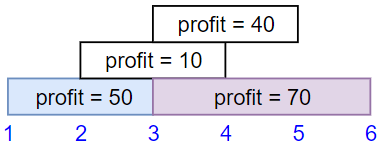Class Solution
- java.lang.Object
-
- g1201_1300.s1235_maximum_profit_in_job_scheduling.Solution
-
public class Solution extends Object
1235 - Maximum Profit in Job Scheduling.Hard
We have
njobs, where every job is scheduled to be done fromstartTime[i]toendTime[i], obtaining a profit ofprofit[i].You’re given the
startTime,endTimeandprofitarrays, return the maximum profit you can take such that there are no two jobs in the subset with overlapping time range.If you choose a job that ends at time
Xyou will be able to start another job that starts at timeX.Example 1:

Input: startTime = [1,2,3,3], endTime = [3,4,5,6], profit = [50,10,40,70]
Output: 120
Explanation: The subset chosen is the first and fourth job. Time range [1-3]+[3-6] , we get profit of 120 = 50 + 70.
Example 2:

Input: startTime = [1,2,3,4,6], endTime = [3,5,10,6,9], profit = [20,20,100,70,60]
Output: 150
Explanation: The subset chosen is the first, fourth and fifth job. Profit obtained 150 = 20 + 70 + 60.
Example 3:

Input: startTime = [1,1,1], endTime = [2,3,4], profit = [5,6,4]
Output: 6
Constraints:
1 <= startTime.length == endTime.length == profit.length <= 5 * 1041 <= startTime[i] < endTime[i] <= 1091 <= profit[i] <= 104
-
-
Constructor Summary
Constructors Constructor Description Solution()
-
Method Summary
All Methods Instance Methods Concrete Methods Modifier and Type Method Description intjobScheduling(int[] startTime, int[] endTime, int[] profit)
-